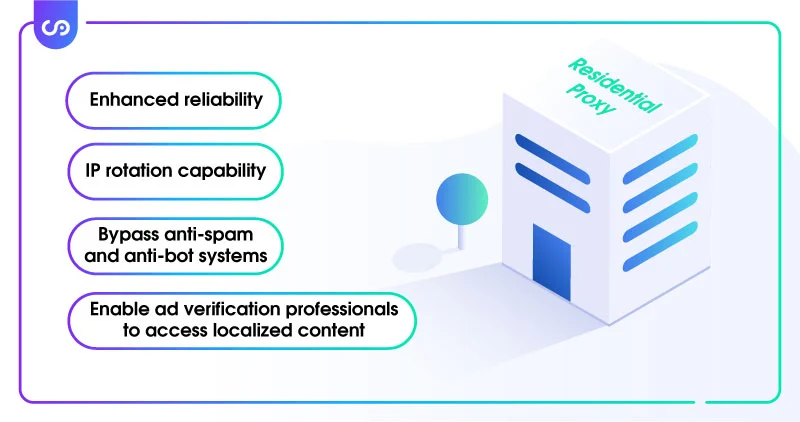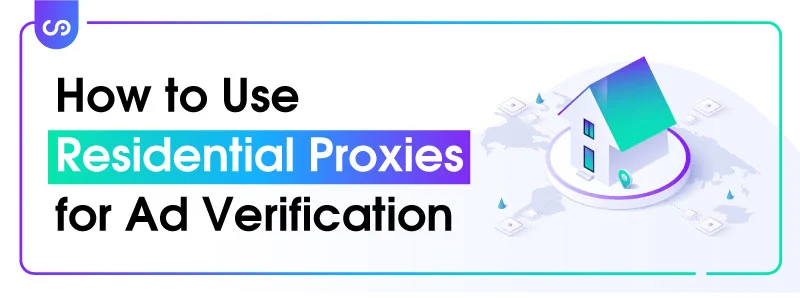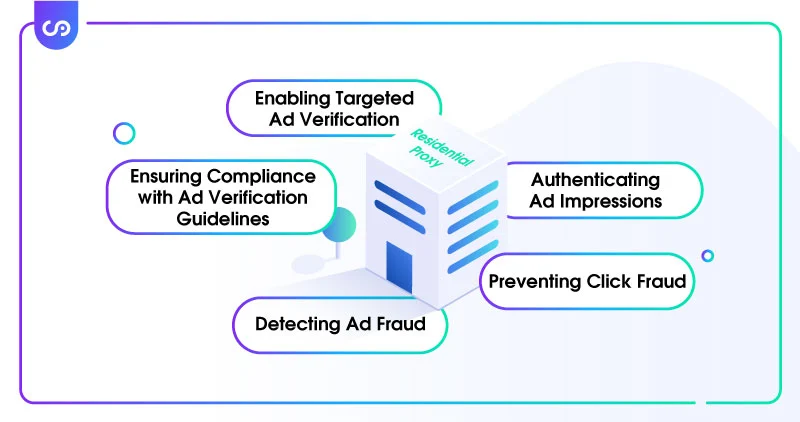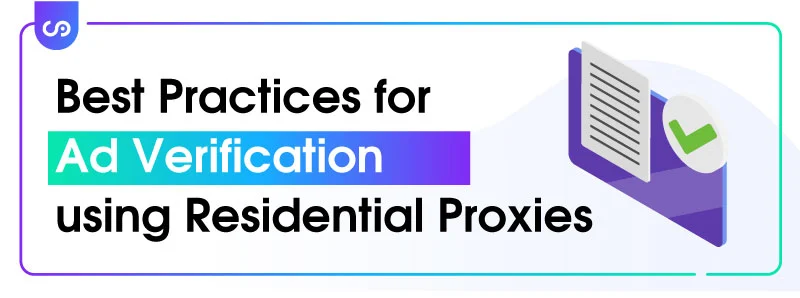In the rapidly evolving world of online advertising, ensuring the accuracy and legitimacy of ad impressions is paramount. Advertisers, agencies, and marketers rely on ad verification to detect and combat fraudulent activities, such as ad fraud and fake impressions.

A crucial tool in this battle is the use of residential proxies, which provide a powerful means to authenticate and verify online advertisements. In this article, we will uncover how to use residential proxies for ad verification. By understanding the benefits and techniques of utilizing residential proxies, advertisers can enhance the reliability of their ad verification processes and safeguard their advertising investments.
Residential Proxies for Ad Verification
In the intricate landscape of online advertising, where billions of impressions are served daily, ad verification has become an indispensable practice. It involves a meticulous process of monitoring, analyzing, and ensuring the quality and legitimacy of ad placements. At the heart of this endeavor lies the concept of proxies, serving as a crucial tool for ad verification. But what exactly is a proxy, and more specifically, what is a residential proxy?
To put it simply, a proxy acts as an intermediary between your computer and the internet. When you request a web page or access an online resource, the proxy server relays that request on your behalf, masking your original IP address in the process. This intermediary layer grants you anonymity, security, and control over your online activities.
Now, let’s delve into the realm of residential proxies. Unlike other types of proxies, such as data center proxies, residential proxies are sourced from genuine residential IP addresses provided by Internet Service Providers (ISPs). In other words, residential proxies are real IP addresses assigned to actual homes. This unique characteristic sets them apart, making them particularly valuable for ad verification purposes.
Advantages of Residential Proxies for Ad Verification
Residential proxies not only offer authenticity and accurate representation of real user behavior, but they also provide a range of other advantages that make them invaluable for ad verification. One key advantage is their ability to bypass anti-spam and anti-bot systems. Many websites and platforms employ sophisticated security measures to detect and block suspicious traffic. However, since residential proxies use genuine IP addresses associated with real households, they are less likely to trigger these security measures, allowing advertisers to conduct ad verification without disruptions.
Another significant advantage of residential proxies is their IP rotation capability. Ad verification often requires conducting multiple checks and tests on different IP addresses to ensure comprehensive coverage. Residential proxies excel in this area by providing a pool of IP addresses that can be rotated dynamically. This rotation mimics the behavior of real users who often switch between IP addresses when browsing the internet, further enhancing the authenticity of the verification process.

Additionally, residential proxies offer enhanced reliability and stability compared to other types of proxies. Since they utilize real residential IP addresses, they are less likely to be flagged as suspicious or blocked by websites and platforms. This reliability ensures uninterrupted ad verification processes, minimizing downtime and maximizing efficiency.
Furthermore, residential proxies enable ad verification professionals to access localized content and advertisements. By using proxies with IP addresses specific to desired locations, advertisers can verify if their ads are being displayed correctly in specific regions or tailor their campaigns to target specific geographical areas. This targeted approach enhances the precision and effectiveness of ad verification efforts, resulting in better campaign performance and higher return on investment.
How to Use Residential Proxies for Ad Verification
Now that we have grasped the power and potential of residential proxies for ad verification, it’s time to dive into the practical steps of utilizing these invaluable tools. From setting up residential proxies to configuring proxy settings for ad verification platforms, here’s a comprehensive guide on how to harness the capabilities of residential proxies effectively.
- Choosing the Right Proxy Service Provider: The first step is to select a reliable and reputable proxy service provider. With various types of proxy services available in the market, it’s essential to opt for a provider that specializes in residential proxies specifically designed for ad verification. These providers offer a wide range of residential IP addresses from different locations, ensuring comprehensive coverage for your verification needs.
- Setting Up Residential Proxies: Once you have chosen a proxy service provider, it’s time to set up your residential proxies. The provider will typically provide you with a set of instructions on how to configure the proxies for your specific needs. This may involve installing proxy management software or configuring proxy settings in your chosen web browser.
- Configuring Proxy Settings for Ad Verification Tools or Platforms: Next, you’ll need to configure the proxy settings for the ad verification tools or platforms you intend to use. Most ad verification tools allow you to specify proxy settings, including the IP address and port number. By inputting the residential proxy details provided by your service provider, you can ensure that your ad verification activities are conducted through the residential IP addresses.

- Rotating IP Addresses and Proxy Pool Management: One of the key advantages of residential proxies is their IP rotation capability. To maximize the effectiveness of your ad verification efforts, consider utilizing IP rotation and proxy pool management features offered by your proxy service provider. This allows you to switch between different IP addresses and distribute your verification requests across a pool of proxies, enhancing authenticity and avoiding detection.
- Monitoring and Analyzing Ad Verification Results: As you conduct ad verification using residential proxies, it’s crucial to monitor and analyze the results. Keep a close eye on metrics such as ad impressions, click-through rates, and conversion rates to assess the performance and quality of your ad placements. By comparing the results against your ad verification goals and benchmarks, you can identify any anomalies or suspicious activities that may require further investigation.
By following these steps and utilizing the unique capabilities of residential proxies, you can enhance the accuracy, reliability, and effectiveness of your ad verification processes. In the next section, we will explore how residential proxies contribute to ad fraud detection and prevention, shedding light on the techniques and strategies employed to ensure the integrity of your advertising campaigns.
How Residential Proxies Help in Ad Verification
In the complex world of online advertising, where ad fraud and fake impressions run rampant, the need for robust ad verification practices has never been more critical. This is where residential proxies come into play, acting as powerful allies in the battle against ad fraud. Let’s uncover how residential proxies contribute to ad verification, detect fraudulent activities, and ensure the integrity of your advertising campaigns.
- Authenticating Ad Impressions: Residential proxies provide a crucial layer of authenticity in ad verification. By utilizing real residential IP addresses, they mimic the browsing behavior of genuine internet users, making it difficult for fraudsters to differentiate between automated ad verification processes and real users. This ensures that your ad impressions are validated accurately, giving you a clear picture of the true performance and quality of your ad placements.
- Detecting Ad Fraud: Residential proxies play a pivotal role in identifying and combating various forms of ad fraud. Through IP rotation and diverse geolocation targeting, residential proxies enable you to simulate browsing behavior from different locations. This helps detect fraudulent activities such as geotargeting manipulation, where fraudsters falsely claim ad impressions from specific regions. By verifying the accuracy of ad placements in different locations, you can identify discrepancies and take appropriate measures to mitigate ad fraud risks.

- Preventing Click Fraud: Click fraud is a persistent challenge in the digital advertising landscape, where fraudsters generate fake clicks to drive up costs or manipulate ad metrics. Residential proxies help in click fraud prevention by enabling you to validate the legitimacy of clicks originating from different IP addresses. By comparing click patterns across various residential proxies, you can identify abnormal click behavior and take necessary actions to safeguard your ad campaigns from click fraud.
- Ensuring Compliance with Ad Verification Guidelines: Residential proxies assist in adhering to ad verification guidelines and industry standards. Ad verification often requires monitoring ad placements on specific platforms or websites. However, continuous monitoring from a single IP address may violate platform policies and result in blocked access. By utilizing residential proxies and rotating IP addresses, you can ensure compliance with platform guidelines while effectively verifying ad placements.
- Enabling Targeted Ad Verification: With the ability to access geographically restricted content, residential proxies empower targeted ad verification. Advertisers can verify if their ads are being displayed correctly in specific regions or demographics by using residential proxies with IP addresses from those locations. This targeted approach ensures precise ad verification, allowing advertisers to optimize their campaigns and increase engagement with the intended audience.
By leveraging the unique capabilities of residential proxies, advertisers can bolster their ad verification processes, detect and prevent ad fraud, and ensure the integrity and accuracy of their advertising campaigns. In the next section, we will explore different proxy solutions tailored specifically for ad verification and compare their features, pricing, and reliability, helping you make informed decisions when selecting the right proxy service provider.
Best Practices for Ad Verification using Residential Proxies
Ad verification using residential proxies is a powerful strategy for ensuring the authenticity and accuracy of your online advertising campaigns. To maximize the effectiveness of your ad verification efforts, consider implementing the following best practices when utilizing residential proxies:
- Establish Clear Ad Verification Goals: Before diving into ad verification, define your goals and objectives. Determine the specific metrics and benchmarks you want to measure and monitor. This clarity will guide your ad verification process and help you assess the success and performance of your campaigns accurately.
- Select a Reliable Residential Proxy Service Provider: Choosing the right residential proxy service provider is crucial. Look for providers that specialize in ad verification and offer a wide range of residential IP addresses from different locations. Consider factors such as reliability, speed, customer support, and pricing when making your selection.
- Utilize IP Rotation and Proxy Pool Management: Take advantage of the IP rotation and proxy pool management features offered by your residential proxy service provider. Regularly rotate your IP addresses and distribute your verification requests across different proxies to ensure a diverse and authentic browsing experience. This helps you avoid detection, enhances accuracy, and improves the reliability of your ad verification activities.

- Monitor and Analyze Verification Results: Regularly monitor and analyze the results of your ad verification efforts. Keep a close eye on key metrics such as impressions, click-through rates, conversions, and discrepancies. Compare the results against your established goals and benchmarks to identify any irregularities or suspicious activities that may require further investigation.
- Stay Up-to-Date with Ad Verification Guidelines: Stay informed about the latest ad verification guidelines and industry standards. Ad networks and platforms may have specific requirements and policies regarding ad verification practices. Ensure compliance with these guidelines to avoid potential conflicts or disruptions to your ad verification activities.
- Collaborate with Ad Verification Partners: Establish strong partnerships with ad verification vendors and partners. Leverage their expertise and technologies to enhance your ad verification processes. Work closely with them to address any challenges or discrepancies that may arise during the verification process.
- Continuously Educate and Train Your Team: Invest in the training and education of your ad verification team. Stay updated on the latest ad fraud techniques and industry trends. Equip your team with the knowledge and skills necessary to effectively utilize residential proxies and navigate the ever-evolving landscape of ad verification.
- Regularly Evaluate and Optimize: Continuously evaluate and optimize your ad verification processes. Identify areas for improvement, refine your strategies, and implement changes as needed. Regularly assess the performance and effectiveness of your ad verification efforts to ensure ongoing success.
By following these best practices, you can enhance the efficiency, accuracy, and reliability of your ad verification using residential proxies.
Conclusion
The utilization of residential proxies for ad verification has become an essential practice in the ever-evolving landscape of online advertising. By harnessing the power of these proxies, advertisers can authenticate ad impressions, detect and prevent ad fraud, and ensure the integrity of their campaigns. Through this comprehensive guide, we have explored what residential proxies are, their advantages, and how to use them effectively for ad verification. By following best practices, staying informed about industry guidelines, and collaborating with ad verification partners, advertisers can maximize the accuracy, reliability, and success of their ad verification efforts. With residential proxies as their secret weapon, advertisers can navigate the digital advertising ecosystem with confidence, making informed decisions, and protecting their advertising investments. Embrace the power of residential proxies and unlock the true potential of ad verification.
FAQs
What are residential proxies for ad verification?
Residential proxies for ad verification are IP addresses obtained from real residential devices, enabling advertisers to validate ad impressions and ensure the authenticity of online advertising campaigns by mimicking genuine user behavior.
How do residential proxies help in detecting ad fraud?
Residential proxies help in detecting ad fraud by providing authentic IP addresses that simulate real user browsing behavior, making it difficult for fraudsters to differentiate between automated verification processes and genuine users, thereby increasing the accuracy and reliability of fraud detection.
Can I use residential proxies for ad verification on any platform or ad network?
In most cases, residential proxies can be used for ad verification on various platforms and ad networks. However, it is important to ensure compliance with the specific guidelines and policies of each platform or network to avoid any potential conflicts or disruptions.
What are the benefits of using residential proxies for ad verification?
The benefits of using residential proxies for ad verification include enhanced authenticity and accuracy in verifying ad impressions, the ability to bypass anti-spam and anti-bot systems, reliable IP rotation for comprehensive coverage, access to localized content and targeted ad verification, and compliance with ad verification guidelines while safeguarding advertising investments against ad fraud.







